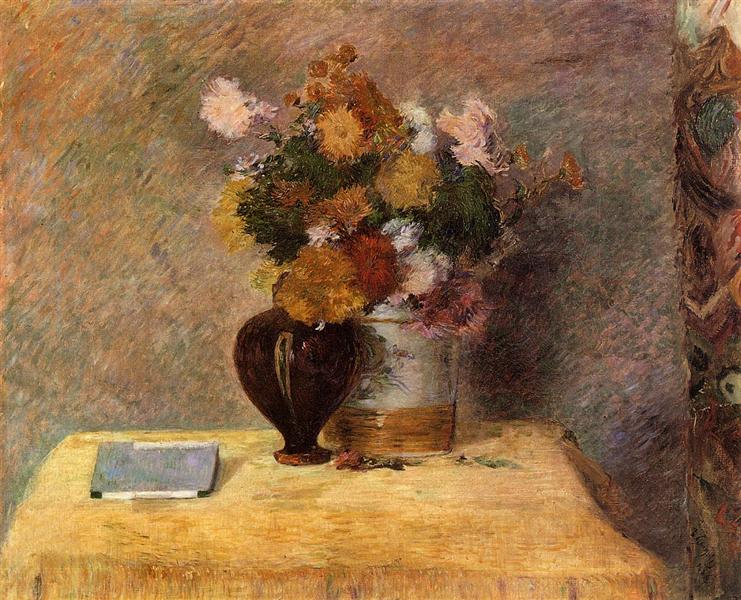Descrizione
Paul Gauguin's 1882 painting Flowers and Japanese Book is a piece that perfectly encapsulates the artist's transition to a more symbolic and modern aesthetic. In this painting, Gauguin delves into the use of vibrant color and a style that challenges the conventions of academic art of his time. The work stands out for its balanced composition, where a vase filled with flowers—in shades ranging from red, pink, and yellow—stands as the central element. These flowers not only serve as an ornament, but also reflect Gauguin's interest in nature and his desire to express the vibrancy of the world through a more abstract visual language.
The Japanese book accompanying the vase adds an intercultural dimension to the work. In the 1880s, Japanese art was strongly influencing European artists, and Gauguin was no exception. The presence of this book, evocative of a distant and exotic world, can be seen as a symbol of the artist’s search for new forms of inspiration and his fascination with Japanese culture. The patterns and colours present in the book, which are subtly suggested by the shapes and tones of the painting, complement the warmth of the flowers, creating a dialogue between the elements of the work.
The use of colour is particularly significant in this painting. Gauguin uses a palette that moves away from realistic representation towards a more emotive vision. The bright tones not only provide visual richness, but also convey a sense of joy and vitality. This approach is characteristic of Gauguin's work, and he would adopt this technique more intensively in his later works in Polynesia, where he would explore symbolism and the expressive use of colour more deeply.
In the context of the development of modern art, Flowers and a Japanese Book is positioned as a bridge between 19th-century realism and the more abstract currents that would emerge later. The work reflects Gauguin's search for a new artistic narrative, one that is not limited to superficial appearance, but seeks to capture the essence of what is represented. Although this painting does not include human figures, its symbolic charge and the treatment of elements such as the flowers and the book arise from a desire to connect with the sensory and emotional experience of the viewer.
The contemporary viewer can probably also appreciate how this work anticipates the break with the oil-on-canvas tradition that many artists would begin to explore in the following decades. The way Gauguin has arranged the elements in the composition and treated light and colour allows for a reflection on life, nature and the interaction between different cultures. In short, “Flowers and Japanese Book” is not only a manifestation of Gauguin’s talent, but also stands as a testimony to his experimentation and his search for a new artistic language that still resonates in contemporary art.
KUADROS ©, a famous painting on your wall.
Hand-made oil painting reproductions, with the quality of professional artists and the distinctive seal of KUADROS ©.
Painting reproduction service with satisfaction guarantee. If you are not completely satisfied with the replica of your painting, we will refund 100% of your money.

